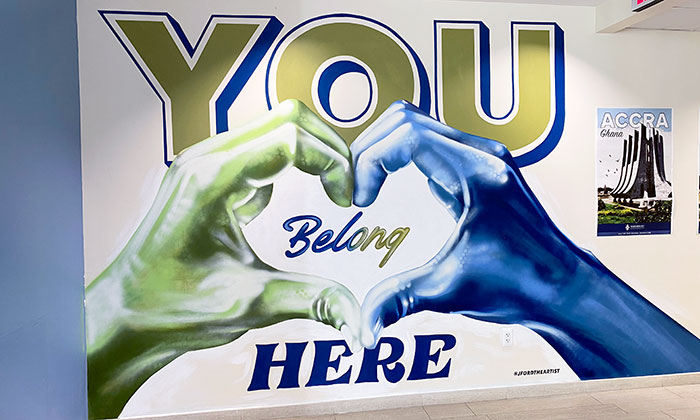During these past several months, many first-year students embarked on their first semester of college while also navigating the ongoing COVID-19 pandemic. In a semester consisting of hybrid classes and socially-distanced events, it’s easy to see how these unusual circumstances may add additional stress and anxiety for first-year students.
Marymount University’s Discover Course Program, however, has provided a safe, friendly environment for students to easily adapt to University life, make connections with other students and get involved on campus. The program, which is required for freshmen and transfer students, has adjusted to best suit the needs of students during this one-of-a-kind semester. The new curriculum, also known as the DSC, was developed to allow students to learn about Marymount and the importance of staying connected to each other and the campus community.
“I appreciated learning about the history of the University and its mission, and I learned about resources that I would not have known about otherwise,” one student said about her DSC experience.
A unique aspect of DSC courses is how Peer Mentors work closely with students and professors in many of the program’s classes. They have included icebreakers, games and helpful discussions during online classes to help students get to know one another and build a sense of community. They’re also available to meet with students one on one to listen to any concerns or worries that students have.
“I wanted to share my experience and impact others,” explained Madeline DeMarco, a Peer Mentor and Orientation Leader who applied for the positions because of her positive experience as a Marymount freshman. “I want other students to find and share the love that I have for Marymount!”
“My Peer Mentor answered all of my questions promptly when I needed help, and they gave me plenty of tips and advice on which activities to attend in order to connect with others and discover the numerous resources that Marymount offers,” added another DSC student. “They also gave me useful tips on how to approach things like signing up for classes each semester.”
One change this semester was how Peer Mentors were called on to work more collaboratively with instructors to plan curricula, class sessions and activities in which students could get involved.
“A big part of what I do as a Peer Mentor is help build that mentor-mentee relationship that is so important for new students to have – that support and mentoring really helps them adjust to college life,” DeMarco said. “It was also interesting for me to go through this with the freshmen because I could see how the college experience has changed to adapt with the new times. I was happy to hear how they connected online via Facebook, group chats and other social media during the summer, and created friendships before they even stepped foot on campus.”
In addition to weekly DSC meetings and one-on-one meetings, students are required to attend four sessions outside of class to receive credit. These sessions focus on important campus resources like Title IX, Campus Safety and Emergency Management, the Advising Center and Diversity & Inclusion. They were also required to attend campus events, connect with University faculty and staff and write personal reflections on how these resources will impact their success at Marymount.
DSC and Student Affairs have close ties, and have been working together to get more first-year and transfer students involved on campus.
“Student Affairs has been intentional about both its weekly and weekend programming,” said Anne Aichele, Senior Director of Student Transition, Engagement and Leadership. “We understand the need for socially distanced and safe in-person events to give students, especially first-years, an opportunity to get to know each other and build community connections. We also recognize that we have many students who are not on campus or who are uncomfortable attending events and programs in person, so we have also implemented both educational and social virtual programming.”
One such event is hosted by Student Counseling Services, which allows students to discuss isolation and anxiety during the COVID-19 pandemic.
“By really reaching out through the MU Engage portal, there have been some fun activities to join – and it’s been the best way to not feel lonely during COVID-19,” one first-year student said.
Many first-year DSC students expressed that the unwavering support and understanding they’ve received from faculty and staff at Marymount has been helpful in their transition to college. While it’s difficult for students to be engaged in the same way that they would during more “normal” semesters, the DSC Program and Student Affairs are working tirelessly to provide new, exciting ways for students to feel connected to each other during these unprecedented times.





